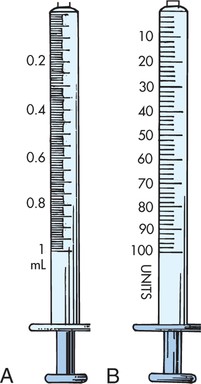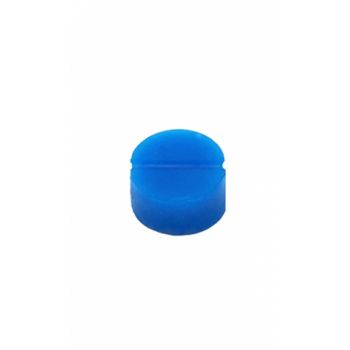Testosterone Cypionate 200mg/mL, 5mL
Topics
Videos
Patient Instructions
This compounded medication is packaged as a single 5mL vial. All testosterone types are suspended in USP oil and this product provides the option of grapeseed oil or sesame oil. Testosterone cypionate in grapeseed oil is commonly preferred for subcutaneous injections due to low viscosity of grapeseed oil compared to other common oils. Grapeseed oil reportedly causes less irritation than commercial cottonseed oil. On the other hand, sesame oil is preferred for intramuscular injections as the resultant level of tenderness is perceived as more manageable
Testosterone cypionate and enanthate are the most common esters prescribed in the US. Both esters became available for use during the 1950s and have been the most popular options for injection therapy since. Both are similar in release and require a minimum of one injection per week to maintain serum testosterone levels. Cypionate and enanthate can be administered in more frequent subcutaneous injections (2-3 injections per week) which is preferred by some patients who want more stable levels with fewer peaks.Testosterone cypionate releases testosterone over 8 days with small amounts remaining for up to two weeks. Injections are usually administered every 3-4 days or every 7 days.
What items do I need to give a shot?
- One alcohol wipe.
- Vial containing the injectable medication.
- The correct size needle and syringe (included in your package)
- You may want to use gloves for your protection or the protection of the person getting the shot.
Syringe Education
- 1cc Insulin syringe (displays units): Each line on the barrel of an insulin syringe is equal to 1mg of medication. So, if your Doctor orders 10 mg of medication, you will draw enough medication to fill the syringe to the ‘10’ line.
- 1mL Leur lock syringe (displays fractioned mL/cc): each line on the barrel an insulin syringe is equal to 0.01mL of medication. So, if your Doctor orders 0.25mL of medication, you will draw enough medication to fill the syringe to the ‘0.25’ line.
- The use of larger syringes should be discussed with your provider.
How to draw up the medication
- Gather the materials you will need. Wash hands with soap and water and then dry.
- Remove safety seal (plastic cap) and wipe rubber-top with alcohol. Wipe rubber-top before every injection to ensure sterility.
- With a fresh, unused syringe, pull back on the plunger to the amount you are injecting, bringing air into the syringe. Your Doctor will decide the dose and frequency that you will be using Testosterone Cypionate.
- Now, remove the plastic cap from the needle. Insert the needle into the vial and slowly push (inject) the air from the syringe into the vial. This will displace the liquid in the vial when you withdraw the medication.
- Turn the vial and syringe upside down and carefully draw the fluid back into the syringe to the line designating the desired amount of medication. If you see any air bubbles, lightly tap or flick the syringe to draw the bubbles to the top (the end with the needle) and expel the air. Note that a small amount of medication may release as well. This is normal. You are now ready to inject.
Subcutaneous Injections
Subcutaneous shots can be given straight in at a 90-degree angle, or at a 45-degree angle. You can give the shot at a 90-degree angle if 2 inches of skin can be grasped between your thumb and first (index) finger. If only 1 inch of skin can be grasped, give the shot at a 45-degree angle
Where can I give a subcutaneous shot?
There are many sites on the body that are safe to give Subcutaneous shots.
- Upper Arm: Uncover the arm to the shoulder to see the whole arm. Have the person getting the shot stand with hand on hip. Stand next to and a little behind the person. Find the area in the middle part of the arm, halfway between the elbow and shoulder. Gently grasp the skin at the back of the arm between your thumb and first 2 fingers. You should have 1-2 inches of skin.
- Abdomen: Uncover the abdomen to see the whole area. Find the waist area. You may give a shot bounded by these landmarks: below the waist, to just above the hip bone, and from where the body curves at the side to about 2 inches from the middle of the abdomen. Use the natural line in the middle of the body as a marker. It may be hard to see, but it is there unless it was covered by surgery. Avoid the surrounding area 2 inches from the bellybutton.
- Thigh: Uncover the entire leg. Find the area between the knee and hip. The middle of the thigh, from mid-front to mid-side, on the outside part of the thigh is a safe site. Gently grasp the area to make sure you can pinch 1-2 inches of skin.
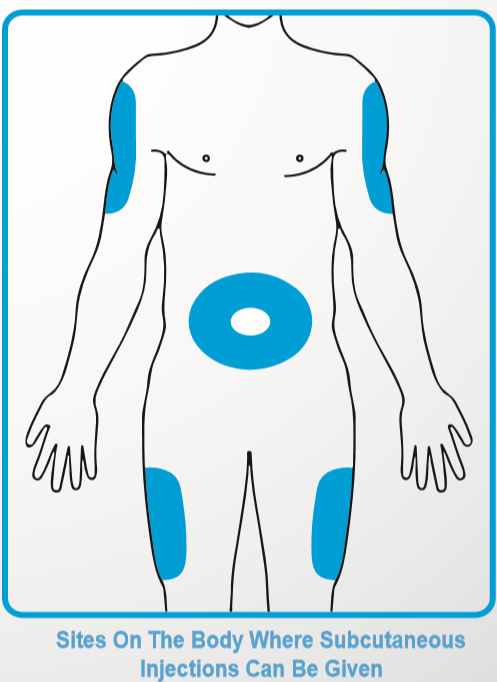
How do I inject medication into subcutaneous tissue?
- Wash your hands thoroughly with soap and dry them completely.
- Open the foil containing the alcohol wipe.
- Using the alcohol wipe, wipe the area where you plan to give the shot. Let the area dry.
- Take the cover off the needle by holding the syringe with your writing hand and pulling on the cover with your other hand. It is like taking a cap off a pen.
- If you will give the shot at a 45-degree angle, hold the syringe in your writing hand. Place the syringe between your thumb and your index second fingers. The needle should be pointing upwards or downwards at the 45-degree angle you plan to use.
- If you will give the shot at a 90-degree angle, hold the syringe with your writing hand. Hold the syringe under your thumb and first finger. Let the barrel of the syringe rest on your second finger. (Many people hold a pen this way when they write.)
- Grasp the skin with the hand not holding the syringe. Holding the syringe barrel tightly with your writing hand, use your wrist to insert the needle through the skin. Sometimes the needle goes in easily. Some people have tougher skin and a little more pressure or quickness is required.
- Once the needle is all the way in, push the plunger down slowly to inject the syringe’s contents.
- Remove the needle at the same angle it went in.
- Dispose of the syringe and needle in a sharps container.
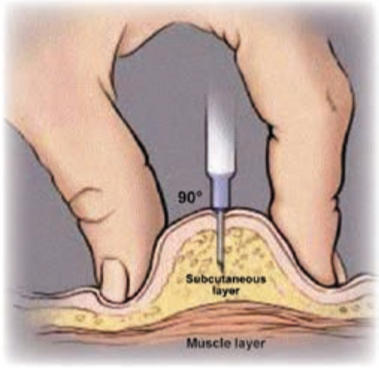
Intramuscular Injections
Where can I give an intramuscular shot?
The skin and the muscles under the skin cover nerves, blood vessels and bones. It is important to give a shot where you will not hurt any of these body parts. There are 6 possible areas, 3 on each side of the body, where an Intramuscular (IM) shot can be given. It is important to choose the correct area. If caregivers showed you what areas are safe, follow their directions. Constantly change the area where you give shots. If you give a shot in the same place every day or even every week, scar tissue can build up. The scar tissue can negatively affect how the medication will work. Following this information will help you choose the safest areas to give an intramuscular injection.
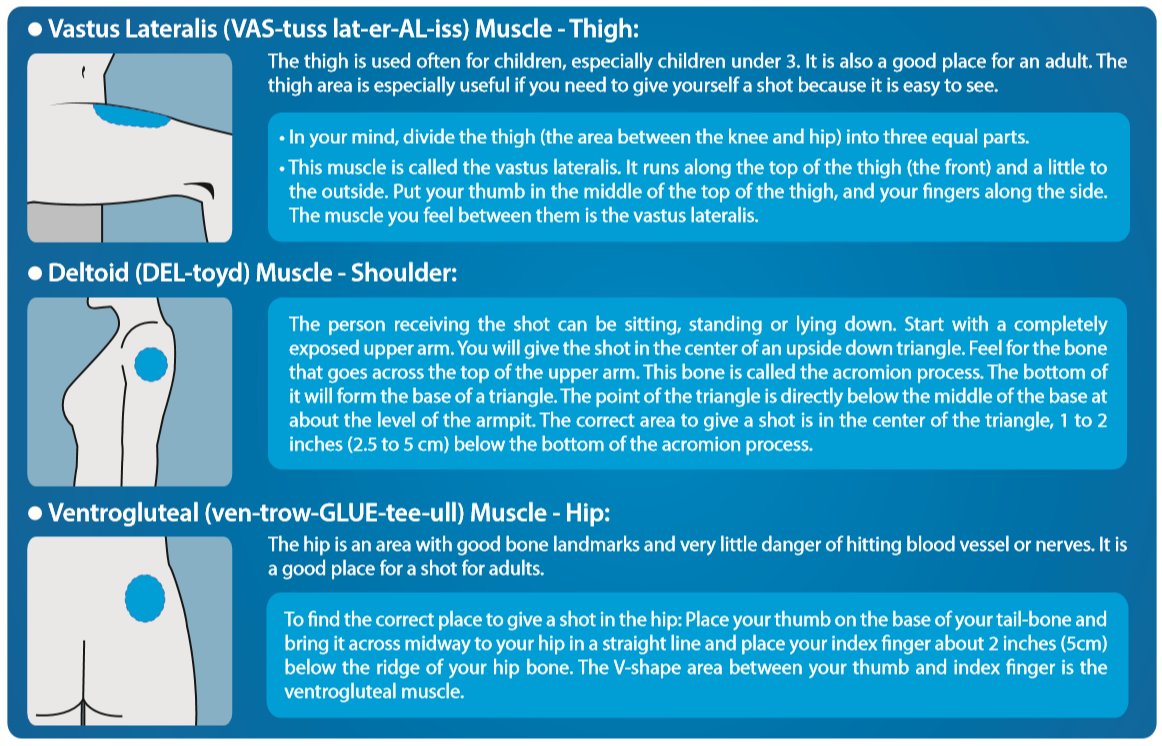
How do I choose the best muscle for the shot?
If your caregivers have told you which muscle to use, follow their directions. Many change with age. For example, the rear-end area is never used for infants or children under 3-years old because it is not developed well enough. The deltoid may work well for a person with developed muscles in the upper body. The deltoid cannot be used if that area is very thin or underused. The muscle must be easy to reach.
How do I inject medication into a muscle?
- Wash your hands thoroughly with soap and dry them completely.
- Put on gloves if necessary. Take the cover off the needle by holding the syringe with your writing hand and pulling on the cover with your other hand. It is like taking a cap off a pen.
- Hold the syringe in the hand you use to write. Place the syringe under your thumb and first finger. Let the barrel of the syringe rest on your second finger. (Many people hold a pen this way when they write.)
- Wipe the area where the needle will go with an alcohol wipe. Let the area dry.
- Depress and pull the skin taut with your free hand. Keep holding the skin a little to the side of where you plan to insert the needle.
- Use your wrist to inject the needle at a 90-degree angle (straight in). The action is like shooting a dart. Do not slowly push the needle in. Do not thrust the needle in, either. Thrusting the needle can cause bruising. The needle is sharp and will go through the skin easily when your wrist action is correct.
- Let go of the skin. As you let go of the skin, hold the syringe so it stays pointed straight in. Pull back on the plunger just a little to make sure you aren’t in a blood vessel. Note: If blood comes back you are likely in a blood vessel. Remove the needle and dispose of both the syringe and the medicine. Repeat the above steps to draw more medicine in a new syringe. When you give the second shot give it on the opposite side.
- Push down on the plunger to inject the medication. Do not force the medication by pushing hard on the plunger. Some medications may sting slightly. They will hurt more if the medication is injected too rapidly.
- Once all the medication is injected, pull the needle out quickly at the same angle it went in.
- Dispose of the syringe and needle in a sharps container.
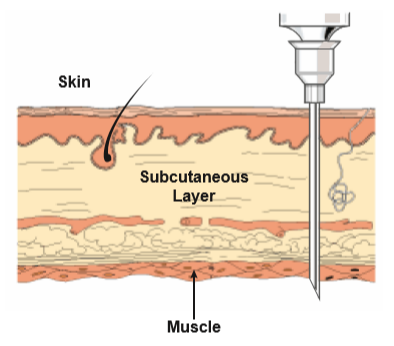
How do I dispose of used syringes and needles?
You can purchase a Sharps Container, a hard-plastic container made for used syringes and needles, at your local pharmacy. If you did not purchase this container with your medication, you can use a hard-plastic container with a screw-on top such as a clothing softener or hard plastic detergent bottle. Be sure you can put both the syringe and the needle into the container easily. Whatever container you choose, be sure needles cannot break through the sides, bottom or top. Call your primary care physician or your local pharmacy to find out what your state or local requirements are for disposing of used syringes and needles.
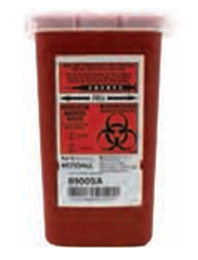
Storage
DO NOT REFRIGERATE. Store Testosterone Cypionate at room temperature.
Storage at low temperatures may result in the separation or “crystallization” of the testosterone within the solution. Injecting testosterone which has been separated may result in pain and swelling at the site of injection which may persist until the testosterone is completely absorbed from the site. If you reside in a state with seasonal low temperatures and we shipped your testosterone through mail; please be aware that separation may have occurred, although it may not be visible to you.
To re-dissolve the testosterone: Place the vial into hot water for at least 5 minutes prior to injection and INJECT SLOWLY. You may boil water at a low temperature or use hot water directly from the faucet. Be careful not to touch the glass vial until it has cooled off after being placed in the hot water. This only needs to be done if the vial has been stored and/or exposed to low temperatures for a period of time, not prior to every injection if the vial is properly stored at room temperature.
Reasons Why Patients Run Out of Testosterone Cypionate Early
- Unavoidable loss
- Over-draw due to using an oversized syringe
- Improper instruction on draw and administration techniques
Where does the unavoidable loss occur?
- There is a small dead space at the base of the syringe where the needle attaches. Even after depressing the plunger completely, medication can be trapped.
- The needle head holds or retains small amounts of medication.
- Note: using a larger syringe, such as a 3mL syringe, for injection results in larger unavoidable loss.
Compounding pharmacies intentionally overfill the injectable vials by as much as 1mL to compensate for unavoidable loss.
What are the benefits of using a smaller syringe?
- You will draw more accurately
- There is less surface area on the syringe for the medication to stick to the sides, however the needle head can still trap small amounts of medication.
- You may find it easier to inject using a smaller volume syringe.
Please review proper drawing and administration techniques above as overdrawing just a small amount of testosterone at each injection has been shown to result in the loss of 1 milliliter or more per injection.
Refills
Testosterone is a controlled substance which is refillable 3 -7 days prior to being due, depending on the pharmacy. Defy Medical sends automated recall reminders to patients two weeks prior to their refill date for any medication (including controlled substances) to allow ample time for contact, order submission, provider review, pharmacy distribution, and shipment.
Videos
H ow to inject IM and SC video
|

